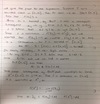Analysis Flashcards
(37 cards)
Lemma; Prove that f(x) = sqrt(x) is continous



Lemma; If f,g: E to R are continuous at c then f+g is continuous at c



Lemma; Suppose that f,g: E to R are continuous at c in E. The the function |f| is continuous



Show that the function
f(x) = 1/q for rationals when x = p/q
0 for irrationals
is discontinous at every rational



Theorem: The function f: R to [-1,1] given by f(x)=sinx is continuous

Show that x^2 = 2 has a root in the interval (0,2)
Consider f(x) = x^2 -2
f(0)= -2
f(2) = 2
so by IVT there is a root
Proposition; Any odd degree polynomial has at least one real root
Correction: Take the x* and x* to be 2A/a2n+1 and -2A/a2n+1

Lemma; Any continuous function f: [a,b] to [a,b] has a fixed point ie there is an x* in [a,b] such that f(x*) = x*

Prove the Extreme Value Theorem

Lemma; The interval (a,b) is open

Lemma; Suppose that A and B are open subsets. Then A u B and A n B are open

Lemma; The interval R[a,b] is closed
We have R[a,b] = (-inf,a) u (b,inf). This is a union of two open sets, so its open
Lemma; A subset A of R is closed if and only if (an) in A with an tends to a implies that a is in A

Lemma; A function f:R to R is continuous if and only if f-1U is open for every open set U in R







State and prove the sandwich rule for continuous limits

State and prove the continuous limits and composition proposition.

Show that if f(x) = sinx then f’(x) = cosx















